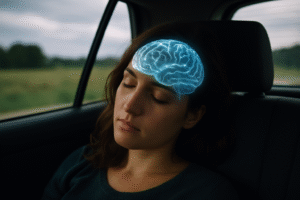Anxious feelings such as those caused by phobias can have many different roots in environmental, social, and biological causes. A traumatic incident, or witnessing a traumatic occurrence, might trigger the development of a phobia in certain people. On the other hand, a person’s susceptibility to developing phobias may be increased by a hereditary propensity for anxiety disorders. Classical conditioning, in which a person identifies a particular object or scenario with a bad event, can often play a role in the development of phobias in some people. Talking to a mental health professional is a good idea if you’re concerned about your phobia’s origins. They can assist you in determining contextualizing or understanding the root of your fear so that you may begin treatment. As hypnotists we don’t diagnose or prescribe like therapists do. We only deal with the symptom management or symptom reduction.

It’s important to understand how your fear system works. It is designed to promote your survival.
When a person experiences a frightening event, it is normal for their body to go through a range of emotional and chemical reactions. These reactions are part of the body’s natural “fight or flight” response, which is designed to help protect the person from harm.
Emotionally, a person may experience fear, anxiety, panic, and stress. They may also feel overwhelmed and have difficulty concentrating.
Chemically, the body’s adrenal gland releases hormones such as adrenaline and cortisol, which prepare the body for physical action. The heart rate and blood pressure may increase, and the muscles may tense up. The body may also release glucose into the bloodstream to provide energy.
These reactions are normal and are not necessarily a cause for concern. However, if a person continues to experience intense emotional and chemical reactions to everyday situations, it may be a sign of an anxiety disorder, and it is important to seek help from a mental health professional.

There can be differences between the original experience of an event and the recollection of it. For example, a person’s recollection of an event may be influenced by their emotional state and understanding at the time of the event, as well as by their emotional state at the time of recollection. In addition, a person’s recollection of an event may be influenced by other factors such as the passage of time, the availability of information about the event, and the person’s overall state of mind.
It is also worth noting that people’s memories are not always completely accurate. Our memories are not like video recordings that play back exactly as they happened. Instead, they are more like narratives that we construct based on the information that is available to us. As a result, there may be differences between a person’s original experience of an event and their recollection of it.

"We carry our past with us, to wit, the primitive and inferior man with his desires and emotions, and it is only with an enormous effort that we can detach ourselves from this burden. If it comes to a neurosis, we invariably have to deal with a considerably intensified shadow. And if such a person wants to be cured it is necessary to find a way in which his conscious personality and his shadow can live together."
Carl Jung Tweet
One of the main ways that hypnosis can help individuals overcome phobias is by desensitizing them to the object or situation that they are afraid of. With traditional therapy this is done through a process called “systematic desensitization,” which involves gradually exposing the individual to their phobia in a controlled, safe environment over many weeks or years. With hypnosis, the hypnotist can offer positive suggestions and help the individual to imagine successfully confronting and overcoming their fear without spending weeks on retraining your emotional responses.
In addition to desensitization, hypnosis can also help individuals to identify and address the underlying causes of their phobia or fear. Often, phobias and fears are rooted in past experiences or beliefs that may not be consciously known to the individual. By accessing the unconscious mind through hypnosis, the hypnotist can help the individual to identify and work through these underlying issues themselves, which can lead to a reduction or elimination of the phobia or fear.
Another way that hypnosis can be helpful for individuals with phobias and fears is by teaching them relaxation techniques and anchoring resource states helping them to develop a sense of control over their thoughts and emotions. Many individuals who suffer from phobias or fears experience anxiety and panic when confronted with their trigger, and hypnosis can help them to learn how to manage and regulate these feelings in a more healthy way.
Overall, hypnotherapy can be an effective treatment for individuals who want to overcome phobias and take control of their lives. By working with a trained hypnotist, individuals can learn to manage and overcome their fears, leading to a greater sense of confidence and well-being.



